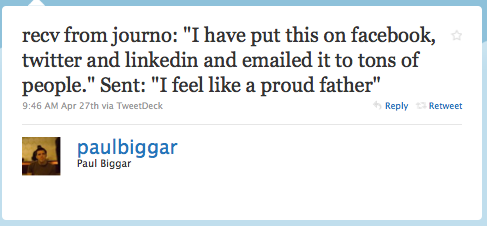Another Journalism-Changing Startup Bites The Dust

The journalism startup NewsLabs, which called itself “the platform for new journalism” and told writers that it would “allow you to focus on your craft while we focus on the tools and infrastructure for growing your online readership and brand,” announced its demise today via a couple of regret-filled internal memos. The money quote is probably this one, from chief technology officer Nathan Chong: “In retrospect, I now believe that we should never have made promises about building your online brand or large amounts of traffic (early email threads about how to deal with large number of comments now seem very ironic).” Ouch.
What was NewsLabs again? A puff piece on it from the Nieman Journalism Lab makes it seem like a slightly classier Examiner.com or Associated Content — journalists, some of whom brought long, storied careers to the table, were given the technological platform to run free (with no assignment editors or pesky copyeditors!). Once the journalist’s “personal brand” was done being built, the money would come in via ad revenue. A rundown from the much happier days of March:
The unbundled news product is one thing; what NewsLabs is proposing is, essentially, unbundling the journalistic process. Revenues will come mostly from ads, Biggar says. “We take a cut out of the money that we earn for them,” meaning in the end that the journalists “get 80 cents out of every dollar that is earned by their content.” (The ad specifies a $30,000-$70,000 “salary” for participating journalists, but notes: “We help journalists make money online, and earn a small portion of the proceeds. So while this isn’t a paid position, we only earn money if you do. (So the 30K-70K is an estimate, not a concrete figure).”) “It’s difficult to know for certain,” Biggar acknowledges, “what our major revenue is going to be in the long term.” Much of NewsLabs’ success — or lack of it — will depend on the individual journalists who sign on to the service, and to the quality and popularity of the journalism they produce.
Aha! But the quality of content, as any journalist who’s been employed by a web-based publisher can tell you, is actually never the case when it comes to ultimately deciding a publication’s success or failure — because marketing an online venture is a much more difficult affair than simply throwing up a few articles and a couple of Tweets and asking the interns to start multiple Digg accounts. Even the most entrenched online brands out there have stumbled when launching new sites in recent months; take a look at CocoPerez.com, the fashiony spinoff of Technicolor-haired Internet scourge Perez Hilton’s eponymous size that atracted some 160,000 unique readers in May. That’s a paltry number when you notice that the big P’s flagship site ranges from 1.7 million to 2.3 million uniques. (And don’t get me started on his dismal track record when it comes to promoting music.) It is very difficult to get readers regularly returning to any site; it takes a blend of pumping out the content and getting linked by high-profile sites both in and out of its immediate topic — and a not-insignificant amount of luck — in order to do so. Internet behaviors can be very entrenched things!
Not having that infrastructure in place would, of course, affect the writers, since it was their salaries that were tied to however many eyeballs they were attracting — note also that any money being made was also likely being used to fund things like basic supplies and reporting costs, whch in the old days would have been subsidized by media organizations. Indeed, in the memo announcing NewsLabs’ demise, the CTO basically admitted, “whoops, we didn’t really study the model sites we were looking at all that closely!”
We liked to use TechCrunch as a good example of an online brand… but I don’t think it was ever made clear how difficult it was to build Arrington’s work into the brand you see today. It certainly wasn’t an instant success and it was incorrect of NewsLabs to give the impression that we could easily replicate this for you.
It was also incorrect of NewsLabs’ own executives to have that impression, apparently, as the whole enterprise was given a whopping three months to thrive — and for a good chunk of that, founder Paul Biggar was off on his honeymoon. (His “sorry everybody” e-mail was much more terse than the one put out by his colleague.) But maybe I should be nice to him, because he was learning too:

